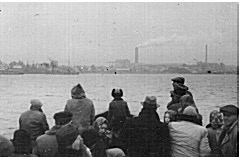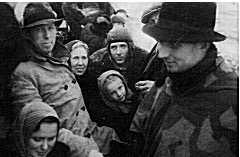Escape from the German and Russian armies. 1944.
In October of 1944 the Russian army was advancing and driving out the German army and occupying Latvia for the second time. The German army was retreating and evacuating through the western Latvian ports Liepāja and Ventspils. They were encouraging the Latvian population to leave their homeland and become refugees in Germany. Many did escape the Russian advance by boarding German ships which took them to German controlled areas. There was also an underground movement that worked with local fishermen to take people to the island of Gotland, a large Swedish island in the Baltic sea. My father and my Godfather had contacts and our family and my father's sister's family moved toward Ventspils ahead of the advancing Russian army. The pickup points for the fishing boats were along the western coast, 20 or 30 kilometres from the major centres, and the rendevous were at night. The idea was to try and get as far as possible away from the Latvian coast in the cover of darkness. The whole western coast was heavily guarded, with one soldier stationed every five hundred yards or so. We were given pickup coordinates and our families and some other individuals built temporary shelter huts from material from the forest.
Building shelters.
Due to the movement of German troops it was very difficult to coordinate a pickup point and time. Arrangements were made and changed half a dozed times. The outcome was that we ended up living in the woods for over a week. We had brought food from the city and at night the men went to farmer's fields and brought back potatoes and sometimes, some other vegetables. One day on the beach, we discovered some large, stainless steel tubs and containers. Apparently a German hospital ship had been sunk and things were being washed ashore. We used these containers to make soup and other meals. We were given new time and coordinates for pickup and moved to a new location about ten kilometres down the coast, where we built new shelters.
One morning, while we were still sleeping, we heard shouts in German "HERAUS.. HERAUS.." ("GET OUT.. GET OUT..") My father, who spoke German, immediately jumped out and confronted the German. What had happened was that some foolish Latvian soldiers had shot a German soldier and now the German army was combing the woods by forming a chain of soldiers about twenty feet apart and walking through the fields and forests. We were suspected of being with some resistance movement and it took a great deal of explenation and persuasion to try and convince the soldiers that we were trying to get to Germany and were waiting the German transport ship to arrive in Ventspils. My dad explained that Ventspils was overcrowded, we could not find a place to stay, and that we had chosed a temporary stay in the woods, away from the congestion and disease in town. We do not know how much they believed, however the result was that all the men were piled into a flat bed truck and taken to the local headquarters. When they arrived there my father was surprised to see my Godfather acting as an interpreter. He told the Germans our story and what they wanted to hear and the Latvians were given instructions in how to behave and what to say. During a point in the interrogation, some very excited German couriers arrived and told that a partisan village had been discovered up the coast and that it contained some mysterious equipment that was suspected to be some secret communications system. They had discovered our previous abandoned camp. The Latvian prisoners had a hard time keeping a straight face. We do not know if the Germans believed our story or for some other reason, however the end result was that the men were allowed to return to their families. That same day we received information about a pickup point that coming night, a few kilometres down the coast. After a walk in the dark in the forest, we arrived at the beach,where the guards had been bribed and were looking the other way. Soon the fishing boat arrived and we went on board. The boat was quite crowded as we were not the only group escaping. The captain pulled anchor and we disappeared into the darkness. In the early light of the morning we sighted, at a distance, a German U-boat that was patrolling the Latvian coastal waters to try and catch boats like ours. When caught, everyone was usually shot. This of course caused some concern on board. The captain pointed the bow of the boat directly at the U-boat to create the smallest possible silhuette. We do not know if they saw us, however they went away. The rest of the journey was uneventful and we arrived in Flen on the island Gotland, Sweden. That was October 16, 1944.
On the Freedom boat.
My Dad on the left, his sister, husband and daughter.
Fisherman Pēteris Jansons was honoured in Sweden for saving 2000 of his fellow countrymen from the German and Russian armies. He made 30 dangerous crossings from Latvia to Sweden.








